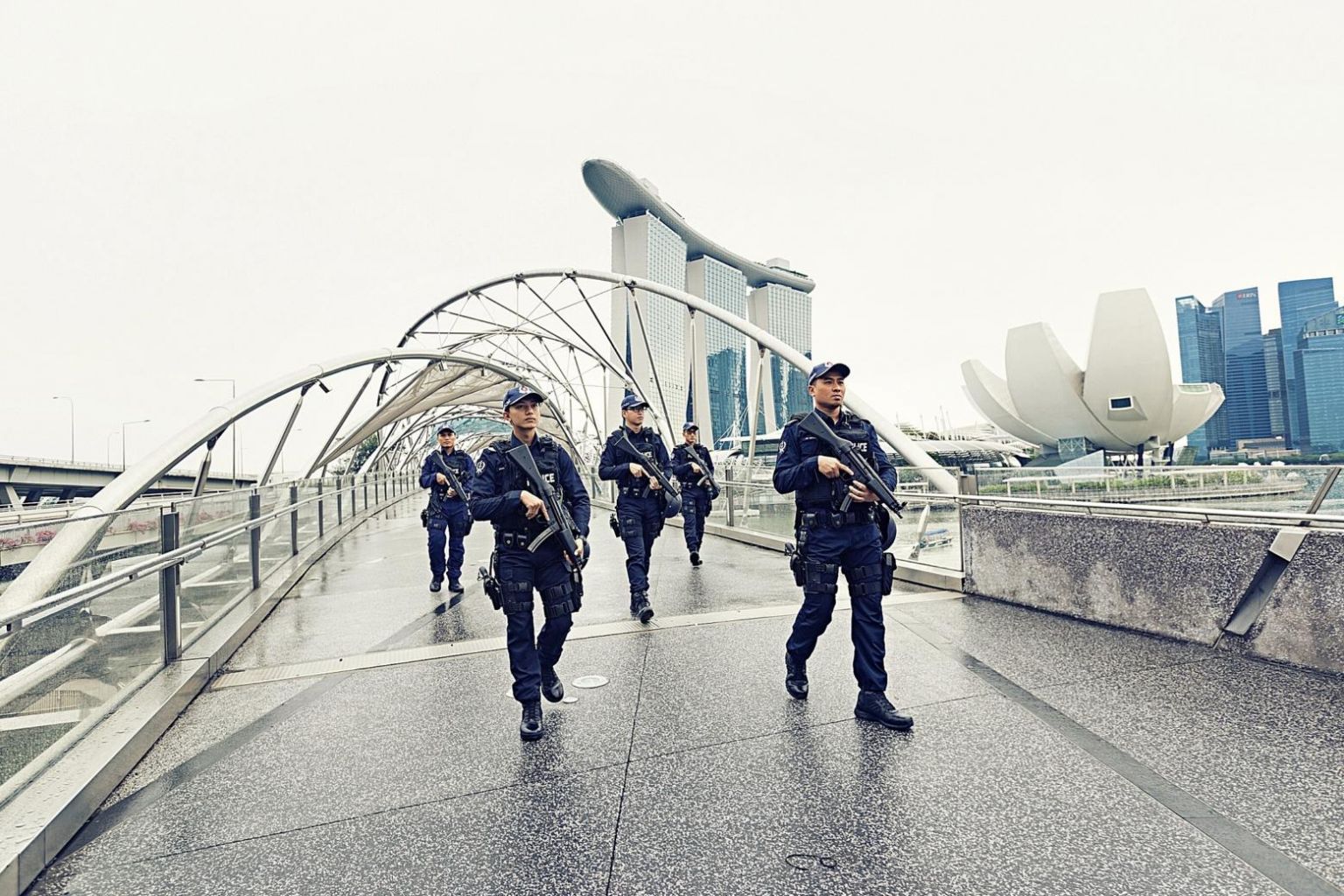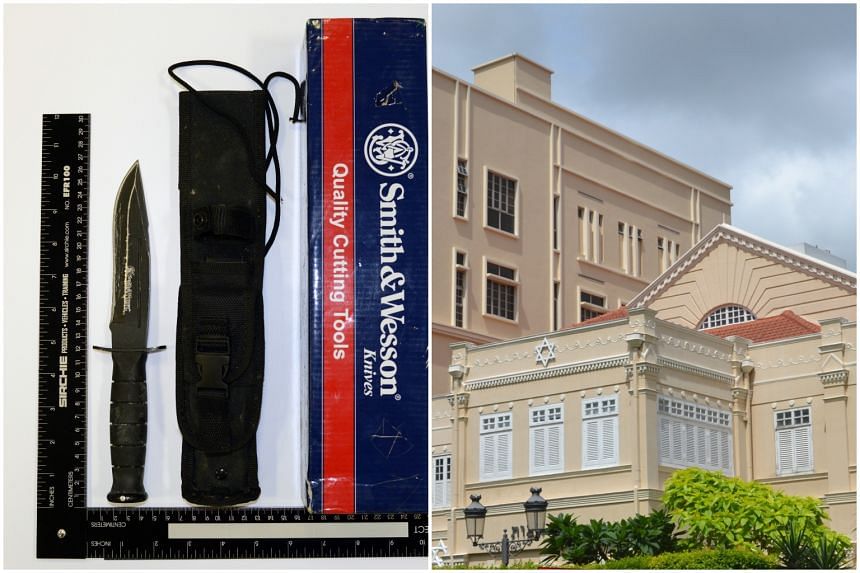Terror threat to S'pore remains high, self-radicalised individuals the primary domestic threat: ISD report
Sign up now: Get ST's newsletters delivered to your inbox

There is currently no specific or credible intelligence that points to an imminent terrorist attack on Singapore, noted the ISD.
PHOTO: MINISTRY OF HOME AFFAIRS
SINGAPORE - The terrorism threat to Singapore remains high as terror groups continue spreading their influence online amid the Covid-19 pandemic, said the Internal Security Department (ISD) on Wednesday (June 23).
Although there is currently no specific or credible intelligence that points to an imminent terrorist attack on Singapore, the department noted that it had averted terrorist attacks by two Singaporean youths who were targeting places of worship here.
These cases underscore the very real threat of lone-wolf attacks by self-radicalised individuals, said the ISD in the third edition of its Singapore Terrorism Threat Assessment Report.
Domestically, the terrorism threat stems mostly from self-radicalised individuals who are influenced by violent materials online, noted the department.
Since 2015, 54 people have been dealt with under the Internal Security Act (ISA) for terrorism-related conduct. Among them, 44 - comprising 32 Singaporeans and 12 foreigners - were self-radicalised.
The Singapore Terrorism Threat Assessment Report, released every two years, is aimed at alerting Singaporeans to the security environment here and regionally. It was first published in June 2017.
In the previous report released in January 2019, the ISD had said the threat to Singapore was high, and that the most pressing threat facing the country was from terror group Islamic State in Iraq and Syria (ISIS) and its affiliates.
ISIS and terror cell Al-Qaeda continue to be major threats, and the ISD said these groups have stepped up online efforts to inspire their supporters to stage terror attacks.
"Global terrorist groups like ISIS and Al-Qaeda have proven resilient and adaptable, despite their leadership losses and setbacks in recent years," said the department.
"Amid the ongoing Covid-19 pandemic, they have stepped up their recruitment and propaganda efforts on social media, encouraging their supporters worldwide to conduct attacks."
Jemaah Islamiyah, the terrorist group linked to Al-Qaeda, remains a latent terror threat, the ISD said. It shared how there are recent signs that the group is rebuilding its military capabilities and may re-engage in terrorist violence in Indonesia.
While Islamist terrorism remains a key concern, far-right extremism is an emerging threat as well, said the department.
It added that such radical behaviour, which espouses racial supremacy and anti-Islam and anti-immigration ideas, has emerged as a major concern overseas and is the fastest growing threat in some western countries.
Far-right extremist groups have reportedly become more organised and are capable of mounting attacks, pointed out the ISD.
It also warned of how such violence could provoke retaliatory attacks from Islamist terrorist groups.
Of the two potential lone-wolf attacks that the department foiled, one was planned by a 16-year-old Singaporean student who was detained under the ISA last December for plotting to attack Muslims at two mosques here on the second anniversary of the Christchurch attacks in New Zealand.
The teenager is the youngest person detained under the ISA and the first detainee to be influenced by far-right extremist ideology.
In February, 20-year-old Amirull Ali, a full-time national serviceman in the Singapore Armed Forces, was detained under the ISA for planning to use a knife to attack and kill Jews leaving a synagogue and to take up arms abroad.

PHOTOS: INTERNAL SECURITY DEPARTMENT, ST FILE
While Singapore has not seen widespread expressions of Islamophobia and such cases are generally sporadic and contained, this does not mean that it is immune to them, the ISD said. It cautioned that such rhetoric is prevalent on social media.
"We have to stay vigilant and take a firm stand against any rhetoric that promotes hatred or animosity towards other communities, and draw the line at the pursuit of any violent action, regardless of how it is justified," it said.
In its report, the department noted how events abroad can evoke strong reactions in the public, and warned that Singaporeans are susceptible to being influenced by these developments, which can motivate at-risk individuals in society to violence.
For instance, in the aftermath of terror attacks in France and other parts of the world arising from the republication of caricatures depicting Prophet Muhammad by French magazine Charlie Hebdo late last year, 37 people in Singapore were investigated for making inflammatory social media postings, among other things.
The ISD also pointed out that the recent Israeli-Palestinian conflict has evoked strong reactions in Singapore and other parts of the world.

Reactions to this conflict have largely steered clear of extremist and violent rhetoric, it added.
Amirull is the only domestic terrorism case detected to be so aggrieved by the conflict to the extent that he wanted to engage in armed violence.
While the Government will continue to step up its counter-terrorism capabilities, the ISD stressed the critical role of the community in fighting such threats, especially in detecting and foiling lone-wolf attacks by self-radicalised people.
It said the anti-terrorism movement SGSecure, which was launched in 2016, has helped to sensitise, train and mobilise the community in the fight against terror.
In a Facebook post on Wednesday, Minister of State for Home Affairs Desmond Tan said the authorities may not be able to uncover every radicalised individual. He too underscored the importance of the community’s response in the fight against terrorism.
"Public vigilance remains key to the detection of self-radicalised individuals. As seen from overseas terrorist incidents and the recent foiled attack plots involving the two self-radicalised Singaporean youths, such attacks are hard to prevent and can happen quickly without much warning," said the ISD.


